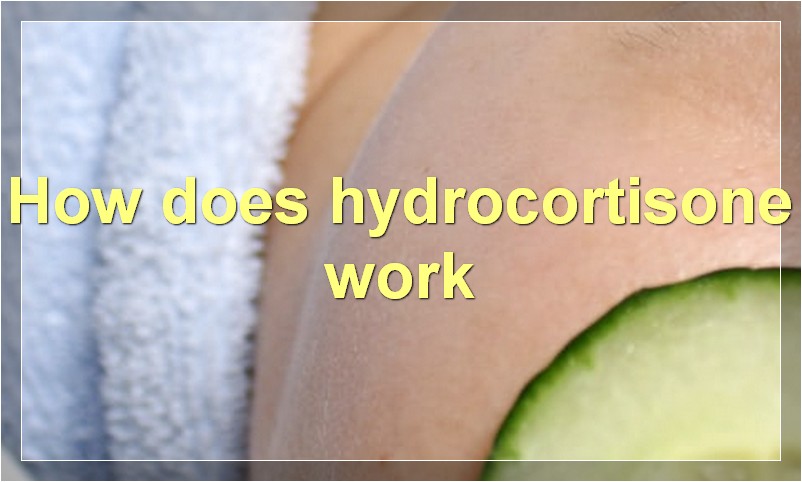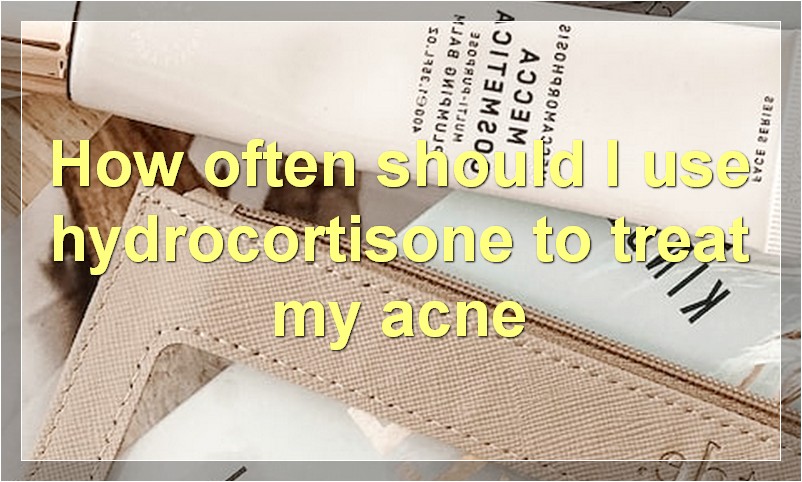If you suffer from acne, you may be wondering if hydrocortisone is the answer to your prayers. Here’s everything you need to know about using hydrocortisone for acne.
What is hydrocortisone
Hydrocortisone is a steroid hormone that is produced by the adrenal gland. It is involved in a variety of important processes in the body, including the stress response, immune function, and metabolism. Hydrocortisone is also used as a medication to treat a variety of conditions, such as allergies, inflammation, and skin conditions.
What Does Hydrocortisone Do?
Hydrocortisone is a steroid hormone that is produced by the adrenal gland. It is involved in a variety of important processes in the body, including the stress response, immune function, and metabolism. Hydrocortisone is also used as a medication to treat a variety of conditions, such as allergies, inflammation, and skin conditions.
The stress response is one of the most well-known functions of hydrocortisone. The release of this hormone into the bloodstream signals the body to prepare for a stressful event. This response results in an increase in heart rate and blood pressure, as well as increased blood sugar levels. These changes help to provide the energy and nutrients needed to deal with a stressful situation.
Hydrocortisone also plays an important role in immunity. This hormone helps to regulate the inflammatory response, which is a key part of the immune system. In addition, hydrocortisone also has anti-inflammatory effects, which can be helpful in treating conditions like allergies and asthma.
Finally, hydrocortisone plays a role in metabolism. This hormone helps to regulate blood sugar levels and fat metabolism. In addition, hydrocortisone helps to maintain bone density and muscle mass.
What Are the Uses of Hydrocortisone?
Hydrocortisone has many different uses both inside and outside of the body. For example, hydrocortisone cream is commonly used to treat skin conditions such as eczema and psoriasis. In addition, hydrocortisone can be used to treat other conditions such as allergies, asthma, and arthritis.
Inside the body, hydrocortisone plays an important role in regulating the stress response and immune function. However, hydrocortisone can also be used to treat certain medical conditions. For example, hydrocortisone injections are often used to treat severe allergic reactions or inflammation. In addition, hydrocortisone tablets can be used to treat adrenal insufficiency, a condition where the body does not produce enough of this hormone.
How does hydrocortisone work

Hydrocortisone is a steroid hormone that has a wide range of effects on the body. It is produced in the adrenal gland and is released into the bloodstream in response to stress. Hydrocortisone regulates blood sugar levels, helps the body to use fat for energy, and suppresses the immune system. It also plays a role in maintaining blood pressure and fluid balance.
Hydrocortisone works by binding to special receptors on cells, which then triggers a complex series of events inside the cells. This ultimately leads to the desired effect – in this case, the suppression of inflammation.
The anti-inflammatory effects of hydrocortisone are thought to be due to its ability to decrease the production of certain inflammatory chemicals called cytokines. It also reduces the activity of white blood cells, which are involved in the inflammatory response.
Hydrocortisone is available as a cream, ointment, or lotion for topical use, or as a tablet or liquid for oral use. It is also available as an injection for use in hospital. Hydrocortisone creams and ointments are commonly used to treat conditions such as eczema and psoriasis.
Is hydrocortisone an effective treatment for acne
Acne is a common skin condition that affects millions of people worldwide. Hydrocortisone is a steroid medication that is commonly used to treat inflammation and swelling. Some research has shown that hydrocortisone can be effective in treating acne, although the evidence is not definitive.
Hydrocortisone works by reducing inflammation and swelling. This can help to decrease the size of pimples and promote healing. In addition, hydrocortisone can help to reduce redness and itching.
There are a few studies that have looked at the use of hydrocortisone for acne. One study found that a 1% hydrocortisone cream was effective in reducing pimple size and redness in patients with mild to moderate acne. Another study found that a 2.5% hydrocortisone cream was effective in reducing pimple size, redness, and swelling in patients with moderate to severe acne.
The evidence supporting the use of hydrocortisone for acne is not definitive, but there are some studies that suggest it may be helpful. If you are considering using hydrocortisone for acne, it is important to speak to your doctor first to discuss the potential risks and benefits.
How long does it take for hydrocortisone to work on acne
Acne is a common skin condition that affects people of all ages. The cause of acne is unknown, but it is thought to be due to a combination of factors, including hormones, genetics, and the overproduction of oil by the sebaceous glands. Treatment for acne can be difficult, and often requires a combination of topical and oral medications. Hydrocortisone is a common topical medication used to treat acne. It works by reducing inflammation and swelling.
Hydrocortisone can be found in over-the-counter (OTC) products as well as prescription strength products. OTC hydrocortisone products are typically milder and not as potent as prescription strength products. Prescription strength hydrocortisone products are typically more potent and may be more likely to cause side effects.
Hydrocortisone typically starts working within 24 hours after it is applied to the skin. However, it may take several days or weeks for the full effect to be seen. Acne can be a chronic condition, so it is important to continue using hydrocortisone even after the acne clears to help prevent it from coming back.
If you are using a hydrocortisone product to treat acne, it is important to follow the directions on the package carefully. Do not use more than directed, as this can increase the risk of side effects. If you experience any side effects, such as excessive dryness or irritation, stop using the product and talk to your doctor.
Are there any side effects associated with using hydrocortisone to treat acne
Acne is a common skin condition that affects people of all ages. While there are many over-the-counter and prescription treatments available, some people prefer to use natural remedies. Hydrocortisone is a steroid that can be used to treat acne.
While hydrocortisone is generally safe, there are some potential side effects associated with its use. These include:
• Dryness: Hydrocortisone can cause the skin to become dry and irritated. This may be more likely if you use it for long periods of time or if you have sensitive skin.
• Thinning of the skin: Long-term use of hydrocortisone can thin the skin, making it more susceptible to injury.
• Stretch marks: Using hydrocortisone on large areas of the body can cause stretch marks.
• Infection: If the skin is already broken or damaged, using hydrocortisone can increase your risk of developing an infection.
If you experience any of these side effects, stop using hydrocortisone and talk to your doctor.
How often should I use hydrocortisone to treat my acne

Hydrocortisone is a type of medication that can be used to treat acne. It works by reducing the inflammation and swelling of the pimples. Hydrocortisone can be bought over-the-counter or prescribed by a doctor.
There is no one-size-fits-all answer to the question of how often to use hydrocortisone to treat acne. The frequency of application will depend on the severity of the acne and the individual’s response to treatment. Some people may need to apply hydrocortisone several times a day, while others may only need to use it once or twice a week.
If you are using hydrocortisone to treat acne, it is important to follow the instructions on the packaging carefully. Do not use more or less hydrocortisone than directed. If you are unsure about how often to use hydrocortisone, speak to a doctor or pharmacist for advice.
What if hydrocortisone doesn’t work to clear my acne
Acne is a common skin condition that can be treated with over-the-counter medication. However, some people may not respond to treatment with hydrocortisone. In this article, we discuss what to do if hydrocortisone doesn’t work to clear your acne.
If you’re struggling with acne, you’re not alone. Acne is a common skin condition that can affect people of all ages. While there are many over-the-counter treatments available, some people may not respond to hydrocortisone.
Hydrocortisone is a steroid that helps to reduce inflammation. It is often used to treat conditions like eczema and psoriasis. However, it can also be effective in treating acne. Hydrocortisone works by reducing the size of the sebaceous glands, which are responsible for producing oil.
If you’ve tried hydrocortisone and it hasn’t worked, don’t give up hope. There are other options available. You may need to try a different medication or see a dermatologist for more aggressive treatment.
Can I use other acne treatments along with hydrocortisone
Acne is a common skin condition that affects people of all ages. While there are many over-the-counter and prescription treatments available, some people may prefer to use natural or home remedies.
Hydrocortisone is a type of steroid that can be used to treat acne. It works by reducing inflammation and swelling.
Some people may wonder if they can use other acne treatments along with hydrocortisone. The answer depends on the specific treatment.
For example, benzoyl peroxide is a common acne treatment that is available over-the-counter. Benzoyl peroxide can interact with certain medications, so it is important to talk to a doctor before using it with hydrocortisone.
Retinoids are another type of acne treatment. They are available in both over-the-counter and prescription forms. Retinoids can make the skin more sensitive to sunlight, so it is important to use sunscreen when using this type of treatment.
Overall, it is important to speak with a doctor before using any new acne treatments, especially if they are being used in conjunction with hydrocortisone. This will help to ensure that the treatments are safe and effective.
Will my acne come back after I stop using hydrocortisone
Yes, your acne may come back after you stop using hydrocortisone. But it’s also possible that it won’t. It all depends on what was causing your acne in the first place.
If your acne was caused by an underlying medical condition, such as polycystic ovary syndrome (PCOS), then stopping hydrocortisone may not make a difference. In this case, you’ll need to continue treatment for your underlying condition in order to keep your acne under control.
However, if your acne was simply a side effect of taking hydrocortisone, then it’s likely that it will go away once you stop using the medication. This is because hydrocortisone can dry out your skin and strip away its natural oils, which can lead to breakouts.
If you’re not sure what’s causing your acne, it’s best to speak to a dermatologist. They can help you figure out the best course of treatment, whether it’s continuing with hydrocortisone or trying something else.
Where can I get more information about hydrocortisone and acne treatment
Hydrocortisone is a type of steroid medication that is commonly used to treat inflammatory skin conditions such as eczema and dermatitis. It can also be used to treat acne, although the efficacy of this treatment method is somewhat controversial.
Hydrocortisone works by reducing inflammation in the skin. This can help to alleviate the symptoms of eczema and dermatitis, and can also help to reduce the size and redness of pimples in acne-affected skin.
There are a number of over-the-counter hydrocortisone products available, as well as prescription strength formulations. If you are considering using hydrocortisone to treat your acne, it is important to speak to a dermatologist or other skin care professional first, as they will be able to advise you on the best course of treatment.





